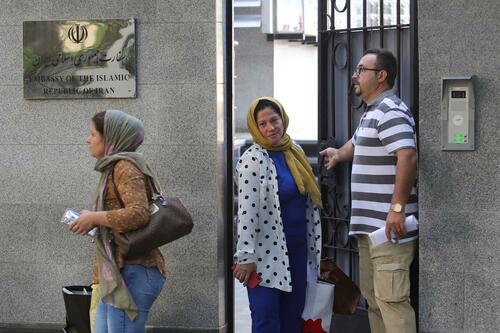Iran Hit With New US Sanctions After Massive Cyberattack On Albania
On Friday the US issued new sanctions targeting Iran, particularly against Iran’s Ministry of Intelligence and Security (MOIS) and its Minister of Intelligence over recent cyberattacks “against the United States and its allies.”
An unprecedented cyberattack was launched against the government of Albania on July 15, which temporarily shut down numerous government websites and public portals. This week, Albanian authorities concluded an investigation, with Prime Minister Edi Rama announcing Wednesday they found “undeniable evidence” that the Iranian government was behind the attack.
Iranian embassy staff were then ordered out of the country, in what’s being described as a historical first of an embassy being shuttered over allegations of a hostile state-backed cyberattack.
Reports and footage from the region showed that the embassy was quickly closed down, and diplomats whisked away Thursday:
Movement inside the Iranian embassy in Tirana continued nonstop from Wednesday into Thursday. An empty barrel was seen taken into the compound and later a fire was started in it, apparently burning documents. A diplomatic car went in and out, while an Albanian police officer communicated with the embassy before two officers entered and left after a few minutes.
Washington expressed its support for shuttering the embassy, and Tirana’s severing formal relations with the Islamic Republic:
The United States supported the move by Albania, a NATO member, and vowed unspecified retaliation against Iran for what it called “a troubling precedent for cyberspace.”
All of this led to Friday’s Treasury announcement, which states: “Since at least 2007, the MOIS and its cyber actor proxies have conducted malicious cyber operations targeting a range of government and private-sector organizations around the world and across various critical infrastructure sectors.”
It detailed of the Albania case: “In July 2022, cyber threat actors assessed to be sponsored by the Government of Iran and MOIS disrupted Albanian government computer systems, forcing the government to suspend online public services for its citizens.”
All #Iranian diplomats have now left the #Iranian Embassy in #Tirana. Albanian Special Forces have entered the Embassy for the last Check!#Albania pic.twitter.com/5TIDnJQmPm
— Isa Myzyraj (@IsamyzyrajAlb) September 8, 2022
“Iran’s cyber attack against Albania disregards norms of responsible peacetime State behavior in cyberspace, which includes a norm on refraining from damaging critical infrastructure that provides services to the public,” the statement continues. “We will not tolerate Iran’s increasingly aggressive cyber activities targeting the United States or our allies and partners.”
For most the past decade tensions have run hot between Iran and Albania given the latter’s support for the outlawed Iranian group Mujahedeen-e-Khalq, or MEK. Albania had given shelter to thousands of MEK members when they were booted from Iraq since 2014. Tehran has maintained the MEK is a foreign-backed terror organization.
Since 2016, Albania is home to a ‘highly secretive’ Iranian rebel group, the so-called People’s Mujahedin of Iran (MEK) who seek to overthrow the current regime of Iran 🇮🇷.
Their headquarters in Albania:pic.twitter.com/dhO58WbNHE
— kos_data (@kos_data) September 7, 2022
The group, often described as a political-religious cult, has the backing of a number of prominent US officials, with accusations that it has been weaponized against Iran by both US and Israeli intelligence. The MEK has supporters around the world, especially in the US, and has likely amassed immense wealth primarily from donors.
Tyler Durden
Sat, 09/10/2022 – 08:45

